

By Ana Roth - 25th November 2017
Source: ![]() BridgeWinners
BridgeWinners
How many times have you made the only lead against 3NT that allowed the contract to make? If you are like me, it seems to happen all the time. What would you lead from this hand:
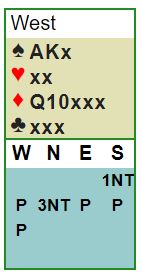
- It might catch spade length from partner. You might beat the hand with 5 spade tricks when a diamond lead would give declarer overtricks.
- If you choose to switch at T2, you will do it after having seen the dummy. Occasionally you can find a devastating heart or club switch that you would never consider without first seeing the dummy.
- Finally, if attacking diamonds is best, you can usually still switch effectively at T2.
When you think about it, the spade lead is a standout, so why is it so easy to miss? Most of us were taught a simple guideline for leading against NT: “Fourth best from longest and strongest.” We were taught much less about when that guideline is appropriate. In my next articles, I will provide guidance for looking deeper than “fourth best from your longest and strongest.”
Many notrump contracts, 3NT contracts in particular, are a race to establish long-suit tricks. The winner is the partnership that establishes their long-suit winners first. An opening lead from a long suit is usually (but not always) an attempt to develop the spot cards of that suit into winners.
When you hold a 3-card honor sequence like KQJxx or QJTxx, your lead combines setting up long-suit tricks with safety, since your honor lead rarely gives up an honor trick to declarer. But the card gods are capricious so broken honor holdings occur more often:
- QTxxx
- KJxxx
- AQxxx
Is it a good idea to blindly lead away from such tenaces? It depends. Leading from a broken suit risks giving away an honor trick in exchange for a chance to set up several long-suit tricks. In general, a lead away from a tenace costs a trick more often than it catches the fitting honor that lets you to develop long suit tricks. However, when you do score long suit tricks, you usually beat the contract. So the reward (defeating the contract) is usually larger than the loss (overtrick).
Let’s look at some guidelines for when you should and should not take that risk.
When Catching A Fitting Card Is Unlikely, A Dangerous Lead Is A Losing Lead
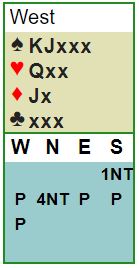
RULE: When partner is short on high cards, a dangerous lead away from a tenace is likely to cost a trick. (The reverse is also true: the more high cards partner rates to hold, the safer it is to lead away from a tenace).
Long Suit Tricks Are Worthless When You Do Not Need Them
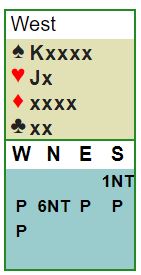
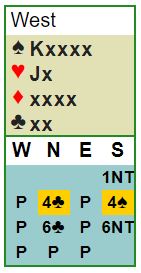
Note that a lead from Kx or Kxx is just as good as Kxxxx when your goal is simply to setup one honor trick. If you decide to go active, suit length does not matter. Strangely enough, when you decide to go passive, length is quite important. Txxxx is an excellent passive lead. Txxxxx is even better. Txx and Tx are much worse, because the more cards partner has in that suit, the more likely he is to hold an honor.
RULE: When you need only a few tricks to beat a contract, focus on developing honor tricks. Beating a 6NT contract via honor tricks normally suggests passive defense. The exception occurs when they have a long suit to run. Then you may need to attack and hope for the best.
Could That Honor Trick Cost The Contract?
Assume you are playing IMPs. Let’s take one hand and contrast two similar auctions.
Auction 1
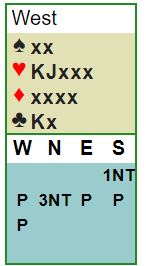
Auction 2
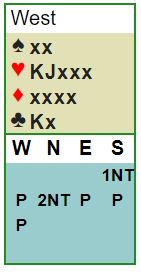
2NT contracts are notorious for being close affairs. The honor trick you lose when you lead into declarer’s AQ is far more likely to cost the contract than in the previous auction, so the potential loss from an ineffective lead has grown. Furthermore, since partner has more high cards, the imperative to run the first 5 tricks has declined (you need 6 to set the contract). Frequently when a heart lead is effective, you can attack the suit later. When the cost of being wrong is higher, the impetus for an aggressive lead goes down.
RULE: in a close contract like 2NT, surrendering an undeserved honor trick will more often cost the contract. Lead more passively.
Make Declarer Sweat
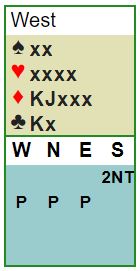
Declarer has a pile of HCP and dummy is nearly broke. That scenario suggests avoiding risky leads for two reasons:
First, when declarer has more points, the risky lead is more likely than usual to cost an honor trick. When you lead away from a tenace you might:
- catch a fitting honor and “win”
- catch a layout where the lead does not gain but does not cost a trick — “break even”
- lead into declarer’s tenace and “lose”
When dummy is broke and declarer strong, most of the break-even layouts are gone, so your risky lead is likely to lose.
Second, since dummy is broke, declarer is going to play this deal out of his hand unless you help him out. Why not make the poor guy sweat instead of giving him a trick, or an otherwise unavailable entry to dummy (such as ![]() Qx opposite
Qx opposite ![]() AJ) with your lead?
AJ) with your lead?
RULE: Any time declarer has shown a big balanced hand, passive defense rates to be best.
Conclusion
Before you automatically place a thumb on the fourth from your longest and strongest, consider the full context of the auction. The auction will tell you things like:
- Declarer will have a hard time playing this on his own. I should lead passively.
- The contract will be close, I can’t afford the risk of giving him his contract-making trick.
- The opponents have the points, My lead is unlikely to catch a fitting card, so will probably blow a trick.
- The opponents have a long running suit. I better try to cash my tricks ASAP.
- My RHO has a rock. Leading into him will be like banging my head into it.
Next week: Clues from your hand, instead of the auction, that tell you not to lead fourth best.
Happy defending!






